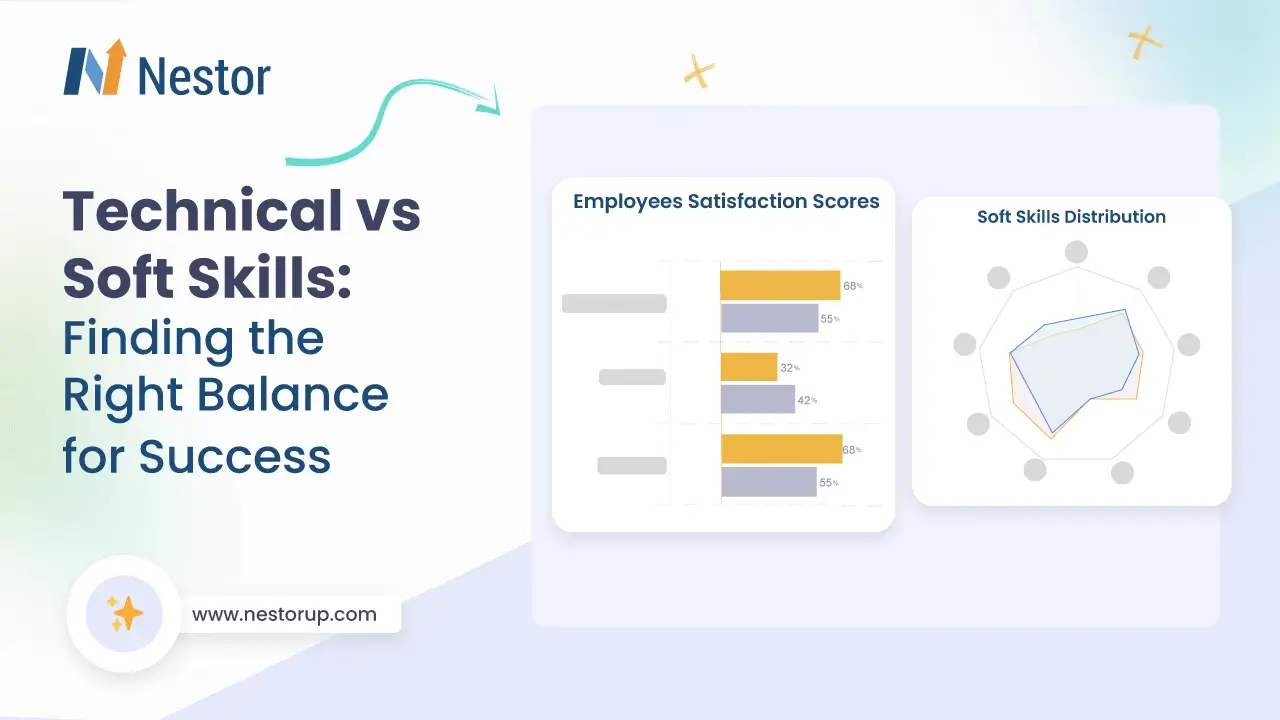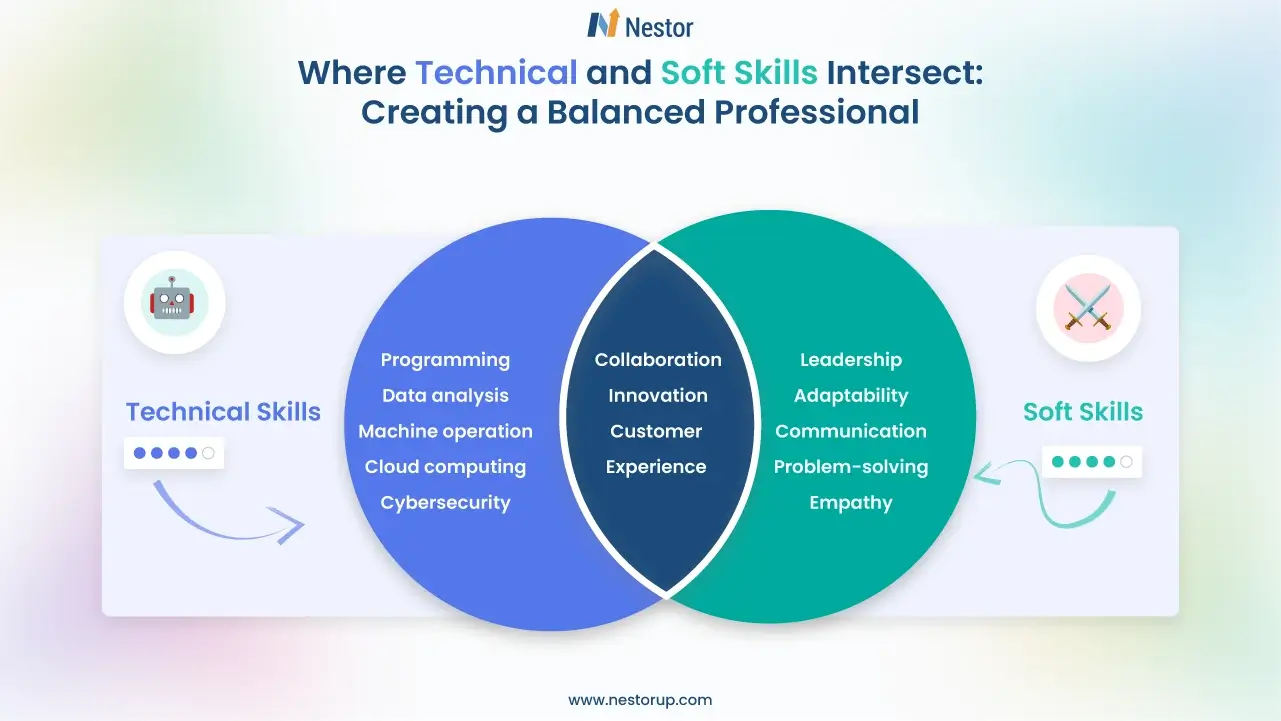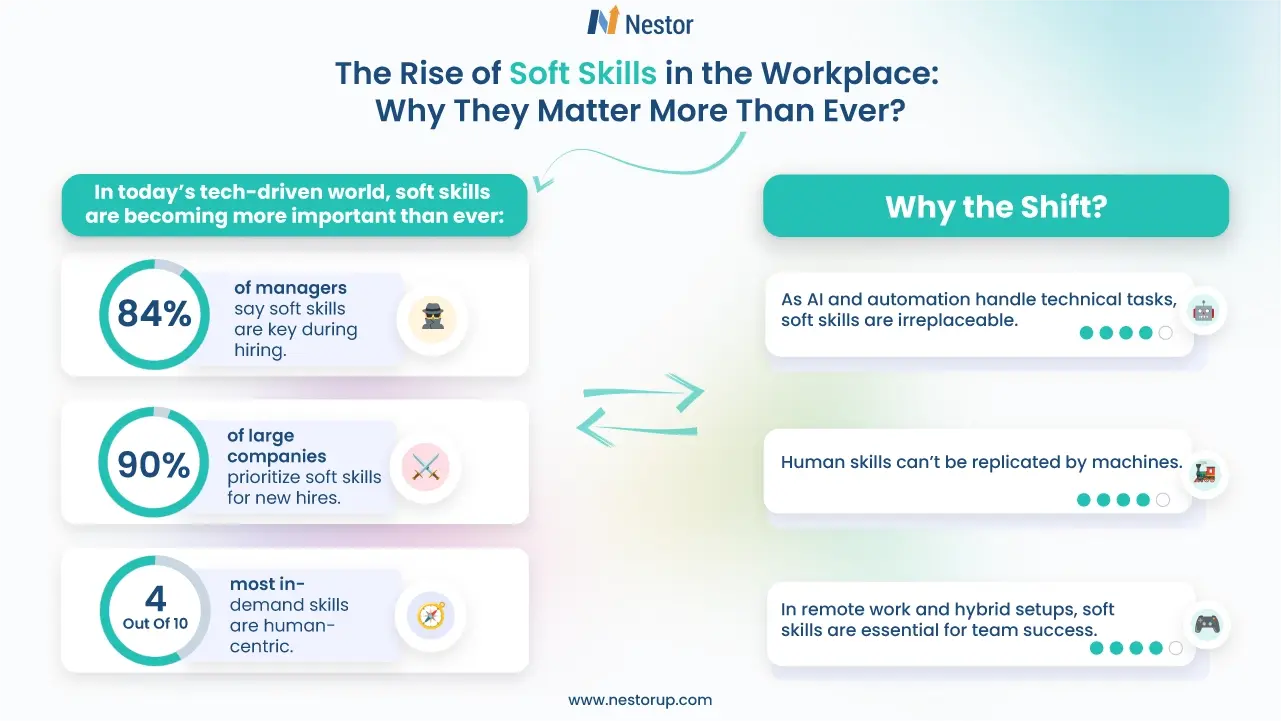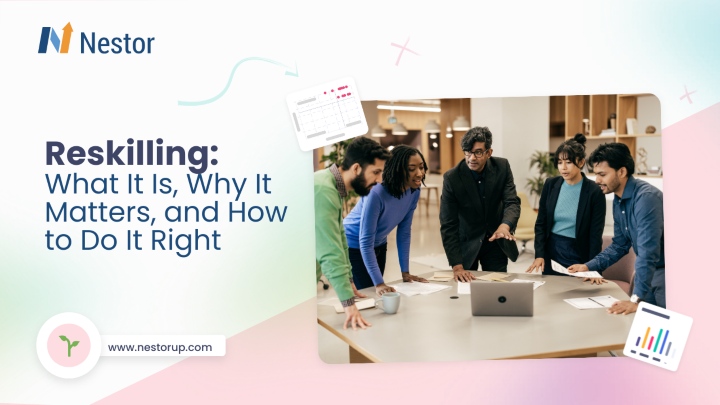
Contents
As industries evolve with technology, the debate of Technical vs Soft Skills has become more complex
While technical expertise remains valuable, soft skills are increasingly seen as critical for career growth, especially in the face of automation and AI advancements A recent study shows that 84% of employees and managers believe new hires must possess and demonstrate soft skills during the hiring process – a figure that jumps to 90% in companies with over 500 employees.
Simultaneously, technical expertise remains important, with 88% of young people aged 16-24 believing digital skills are be essential to their future careers.
Our modern workplaces have gone through significant changes and have become more flexible, human-centric, and global than ever before. In these diverse and interconnected environments, skills have emerged as the driving force behind adaptability, resilience, and innovation — which inevitably leads to questions like: technical skills vs soft skills, what’s the difference between them? Is there a perfect balance that can propel us toward professional excellence?
Both employers and employees need to better understand these two categories of skills in order to start investing in actions that will keep them relevant and successful in the long run.
In this article, we explore characteristics and key differences between technical and soft skills and explain why both are essential and how they contribute to professional success
What Are Technical Skills?
Technical skills refer to abilities that are specific and measurable. They are also referred to as hard skills. For example, programming languages, data analysis tools, specific software proficiency, or specialized equipment operation are all examples of technical skills. They can be relatively easy to quantify and test.
Thanks to technical skills, workers can effectively use specific techniques, machines, and tools to improve their work rates. Moreover, these skills play a direct role in minimizing potential errors and enabling the automation of routine tasks.
Consider, the healthcare industry. In this field, technical skills can mean the difference between life and death. For instance, think of a surgeon’s precise hand movements, a radiologist’s interpretation of complex imaging, and a pharmacist’s knowledge of drug interactions. Together, all these technical capabilities form the foundation of patient care.
Individuals acquire technical skills through structured learning pathways, which may include formal education, training, or certifications. Besides education, hands-on experience contributes to building technical expertise. Furthermore, each of these methods reinforces the others. Together, they create a comprehensive foundation for skill development.
The beauty of technical skills lies in their clarity; There’s often a clear path from novice to expert, with definable milestones. Additionally, progress can be measured in terms of problems solved, systems built, or certifications earned.
Examples of Technical Skills
- programming and coding
- cloud computing
- cybersecurity
- data science
- machine learning and AI
- UI and UX design
- video editing
What Are Soft Skills?
Soft skills are the abilities that help individuals integrate into various work environments. They support a harmonious interaction with peers, managers and stakeholders. Soft skills are also known as human skills essential skills, or people skills. -They make great team players and excellent communicators. They provide the capability to navigate a wide range of social situations in work and personal life.
In essence, soft skills determine how a particular employee works, either individually or with others. Moreover, they become exponentially important as one progresses in their career and eventually moves into managerial or leadership positions.
According to Josh Bersin’s research 89% of surveyed workers reported that bad hires typically have poor soft skills. This finding clearly highlights the truth in our current work environment. In fact, technical expertise alone isn’t enough to ensure professional success. Moreover, effective collaboration, conflict management, adapting to change, and clear communication ultimately make the difference between a good employee and an exceptional one.
Unlike technical skills,, soft skills are more subjective and difficult to measure. Soft skills are often evident in action rather than on paper. They are revealed through behavior patterns and interpersonal interactions over time. Their subjectivity makes it difficult for employees to demonstrate these skills. As a result, employers have a hard time – evaluating them effectively.
Learn more about the importance of soft skills.
Examples of Soft Skills
- leadership
- adaptability
- communication
- problem-solving
- critical thinking
- empathy
- networking
Technical Skills vs Soft Skills: Key Differences
When we examine technical and soft skills side by side, we uncover fundamental differences. These differences shape how the skills are developed, applied, and valued in the professional world.

Transferability
Hard skills are industry-focused. They may not easily transfer between different fields. Thus, people going through career changes or lateral moves often need thoughtful preparation. They require training, and support to adjust their skill set to new role requirements . For example, a software engineer’s technical knowledge might not translate well to a completely different role without significant retraining.
Soft skills are highly transferable. They are valuable and desirable for both employees and employers. Why? Because they lead to more dynamic and fulfilling career paths. Whether you’re working in marketing, finance, or healthcare, skills like communication, empathy, and teamwork are universally valued.
Learning & Development
Technical skills typically follow a structured learning path through formal education, training programs, certifications, or on-the-job training. Moreover, the learning process is typically straightforward, allowing you to chart a clear course from beginner to expert. In addition, you can define milestones along the way. With enough time and effort, they are relatively easy to acquire. You either know how to code in Python, or you don’t – there’s less room for ambiguity.
Soft skills develop organically and are less structured. These skills are often shaped by personal experiences, relationships, and self-reflection. They can be refined through coaching, mentorship. Soft skills can also be acquired through trial and error in various social and professional situations. The learning curve for soft skills isn’t linear. It’s a continuous, lifelong journey of refinement and adaptation.
Tracking and measurement
When it comes to evaluation, technical skills have a clear objective advantage. You can test someone’s proficiency in a specific software or their ability to perform certain technical tasks by using various assessment methods. Furthermore, organizations can easily track the hard skills of their workforce through multiple approaches. These methods include previous work, assignments, self-assessments, skill assessments, performance evaluations, and the list can go on.
Evaluating soft skills is more subjective. It often relies on perceptions or input based on interactions and interpersonal dynamics at work. Peer feedback and 360-degree surveys are great tools in that direction. During the hiring process, behavioral interview questions can – be a good indicator of their human skills. In addition, the overall image of how the candidate presents themselves can support the evaluation.
Certification
Depending on the industry or local regulations, some hard skills can only be used -after being validated by specific institutions or boards. This is especially the case for engineers, architects, lawyers and doctors.
Human skills, on the other hand, aren’t usually backed by certificates. Instead, they can be revealed by activities unrelated to work. These activities include candidate’s volunteering efforts, side hustles, or career choices.
Still, it’s not uncommon to encounter certifications that target soft skills, including leadership, corporate communication, team work, and so on.
Relevance
In technology-related fields, technical skills can have a relatively short shelf life. What’s cutting-edge today might be obsolete tomorrow,. Professionals are required to constantly update their knowledge and capabilities. That’s why internal upskilling and reskilling initiatives are increasingly important and necessary.
The opposite is true for soft skills. They aren’t impacted by the new AI-driven world or by the Fourth Industrial Revolution. In fact, as automation and robots replace simple tasks and roles, soft skills will become a key asset. They will allow future members of the workforce to remain relevant and provide value by solving more complex challenges.
In a world where technical tasks can increasingly be automated, our human skills become our most valuable asset.
Technical Skills vs Soft Skills: The Growing Importance in the Modern Workplace
As industries shift due to technological advancements, soft skills are becoming increasingly valuable. According to LinkedIn’s 2023 Workplace Learning Report, four out of the top 10 skills companies need most are human-centric, including communication, teamwork, and leadership.
4 out of the top 10 skills companies need the most are human skills: management, communication, leadership, and teamwork.
When we examine technical and soft skills side by side, we see that their relationship is more complex than a simple either/or dichotomy. In reality, these skill sets often complement each other in ways that can significantly enhance professional effectiveness.
For most job roles, a combination of hard and soft skills is required. The proportion will vary, of course. But in an ideal world, the best-fit candidate has a comprehensive skill set, including both technical and interpersonal abilities.
However, many organizations and HR recruiters are more inclined to select someone with proven soft skills over hard skills. Why? Because soft skills are related to personal behaviors and traits. They are more difficult to develop or change over time.
The growing importance of human skills is also fueled by external events. For example, the pandemic has seen businesses shift to fully remote or hybrid work. In these environments, where face-to-face interactions aren’t an option, soft skills like communication and empathy become essential. They maintain positive interactions and a supportive atmosphere.
Consider the following scenarios that illustrate the interplay of technical and soft skills in modern workplaces:
Remote Work Revolution:
- The shift to remote work has amplified the importance of both skill sets.
- Technical skills enable effective use of digital collaboration tools and platforms.
- Soft skills like self-management, virtual communication, and adaptability have become essential for remote work success.
Cross-functional Collaboration:
- Modern projects often require diverse teams working together.
- Technical experts need to clearly communicate complex concepts to non-technical stakeholders.
- Soft skills facilitate effective teamwork and knowledge sharing across departmental boundaries.
Innovation and Problem-solving:
- Breakthrough solutions often emerge from combining both skill sets.
- Technical knowledge provides the tools and possibilities.
- Soft skills like creativity and critical thinking help apply technical knowledge in novel ways.
Customer Experience:
- In a service-oriented economy, both skill sets impact customer satisfaction.
- Technical skills ensure product/service quality and efficient problem resolution.
- Soft skills enable understanding customer needs and providing empathetic, effective communication.
Organizations that are shifting (or at least considering) agile approaches will also value soft skills more than hard ones. They act as a foundation for internal mobility programs and the development of a more resilient and adaptable workforce.
Why Soft Skills Are Considered the Skills of the Future
There are two main reasons why human skills are expected to become critical in the (near) future:
- automation, robots, and AI will make (some) technical skills less relevant over time
- soft skills aren’t likely to become obsolete any time soon and cannot be replicated by machine learning or intelligent algorithms, at least for now

While it’s easy to talk about the inevitable disappearance of jobs, we should instead focus on the new types of jobs that will rise thanks to the AI revolution.
For most of these roles, candidates will need more well-rounded soft skills that enable them to solve complex problems. Providing human touch is critical in all areas, whether is healthcare, sales or marketing.
Finding the Right Balance
Achieving an optimal balance of technical and soft skills across your organization requires a strategic approach:
Organizational Assessment
Audit Current Capabilities:
- Map existing technical skills against business requirements
- Evaluate leadership and communication capabilities at all levels
- Identify skill gaps that may hinder business objectives
Analyze Competitive Landscape:
- Benchmark your organization’s skill mix against industry leaders
- Identify skill differentiators that could provide competitive advantage
Strategic Skill Development
Technical Skill Investment:
- Implement targeted training programs aligned with business goals
- Consider certifications that directly impact business capabilities
- Develop internal knowledge-sharing platforms
- Track ROI on technical training investments
Soft Skill Enhancement:
- Provide leadership development programs
- Implement mentoring and coaching initiatives
- Offer communication and emotional intelligence workshops
- Create opportunities for cross-functional collaboration
Implementation in Business Operations
Hiring Practices:
- Develop interview processes that assess both technical and soft skills
- Create job descriptions that accurately reflect required skill balance
- Consider cultural fit alongside technical capabilities
Performance Management:
- Include both technical and soft skill metrics in evaluations
- Recognize and reward balanced skill development
- Provide feedback on both technical performance and interpersonal effectiveness
Business Impact Measurement
Key Performance Indicators:
- Track productivity improvements from technical skill development
- Measure client satisfaction and retention rates
- Monitor employee engagement and turnover
- Assess project success rates and team collaboration effectiveness
Return on Investment:
- Calculate cost savings from improved technical efficiency
- Evaluate revenue growth linked to enhanced client relationships
- Measure reduced recruitment costs from improved employee retention
Business Case Considerations
Cost-Benefit Analysis:
- Balance investment in technical training against soft skill development
- Consider long-term impact on business growth and sustainability
Risk Management:
- Assess risks of skill imbalances on project delivery and client satisfaction
- Develop contingency plans for critical skill gaps
The key lies in viewing skill development as a strategic business initiative rather than just an HR function. By aligning skill development with business objectives, organizations can create a workforce that is both technically proficient and emotionally intelligent.
Final Thoughts on Technical Skills vs Soft Skills
Although technical abilities will remain important, the spotlight is quickly shifting toward soft skills in the realm of employment.
As AI and robots evolve from mere tools into cooperative partners, both businesses and individuals must emphasize nurturing these essential abilities. This strategic focus will guarantee a strong foundation, enabling relevancy and success regardless of what the future of work might bring.
Frequently Asked Questions (FAQ) on Technical Skills vs Soft Skills
What are technical skills?
Technical skills are specific, quantifiable abilities related to a particular field or profession. In addition, they often involve the use of tools, software, or methodologies unique to a specific industry. For instance, examples include coding, data analysis, graphic design, engineering, and operating machinery.
What are soft skills?
Soft skills are personal attributes that enable effective interaction and collaboration with others. Unlike technical skills, soft skills are often more subjective and include communication, teamwork, adaptability, problem-solving, emotional intelligence, and conflict resolution.
Which is more important for business success – technical skills vs soft skills?
Both are essential, but their importance varies by role and context. Research shows 84% of managers value soft skills in new hires, while 83% of HR professionals report technical skill gaps. Success comes from finding the right balance for specific roles and business needs.
How can we assess the technical and soft skills of our employees?
Use practical tests and project-based assessments for technical skills. For soft skills, conduct behavioral interviews and gather peer feedback to gain insights into interpersonal abilities.
How can we create effective training programs that address both technical and soft skills?
Conduct skill assessments to identify gaps, integrate both skill sets into training modules, and use diverse methods like workshops and e-learning to engage employees.
How do automation and AI affect skill balance?
As automation increases:
- Human soft skills become more valuable
- Technical skills shift toward AI management
- Combining both skill types becomes crucial











